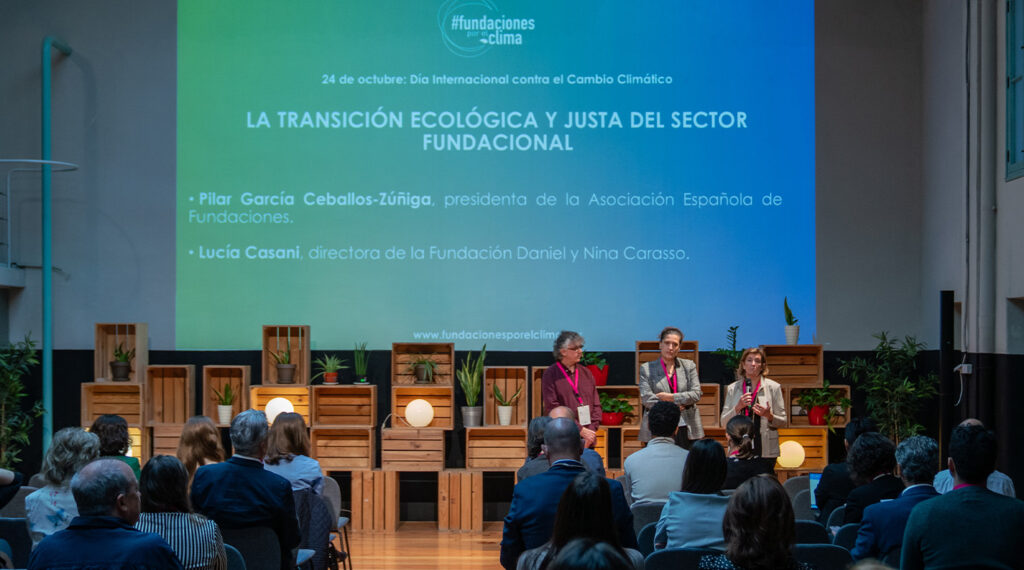Foundations that think in networks to address the climate crisis: The case of Spain

2024 ended with the news we feared: the global average temperature has risen by more than 1.5º above pre-industrial levels, and in the Arctic, it has reached an increase of 4º.
Concern is growing, even among the most sceptical. The World Economic Forum’s periodic Global Risks Report, based on a survey of 900 experts from various countries, ranks misinformation as the top short-term risk within two years, and extreme weather events as the top long-term risk within ten years. (World Economic Forum Global Risks. Perception Survey 2024-2025)
We have learned a lot about both risks in Spain over the past few months. Between 28 October and 2 November last year, we experienced one of the most devastating weather events in the country’s history, with 224 confirmed fatalities and large areas ravaged that are still struggling to recover today. At the same time, rumours and misinformation began to spread, as they often do in times of crisis, taking advantage of the social shock. Fortunately, Spain continues to have a high level of awareness regarding climate change, and a large percentage of the population still considers it an urgent priority issue.

Just four days before this crisis, on 24 October, International Day Against Climate Change, we held the first meeting in Madrid of the 290 foundations that signed the Fundaciones por el Clima Pact – the climate commitment promoted by the Spanish Association of Foundations. At this event, we presented the results of the first survey of the signatory foundations on progress in fulfilling the pact – aligned with similar reports from the global Philanthropy for Climate network. The vast majority of these foundations believe they have made progress in integrating climate change into their organisations in recent years, although action seems to be moving more slowly. For example, only 30% have begun measuring their carbon footprint (Fundaciones por el Clima Report 2024).
That’s why, at this event, we agreed to include five specific commitments in 2025, aligned with the European Green Deal: setting public climate mitigation and adaptation goals; ensuring that activities take into account the goal of achieving emission neutrality by 2050; measuring and reducing carbon footprints; conducting annual accountability reports; and, for corporate foundations, the founding company or entity must also meet the previous criteria.
Additionally, we included a text in the introduction of the pact that more explicitly refers to a fair ecological transition and the role foundations can play in this transition: “The foundation sector will join efforts toward an ecological transition that considers the differential social impact and generates inclusion and opportunities for all people, including vulnerable groups such as the elderly, children, people with disabilities, those in poverty, or migrants, among others, while also considering gender equality.”
Four days later, the DANA storm tested the role that foundations can play in these crises. The Horta Sud Community Foundation, which works in a region of Valencia where more than 250,000 people were affected by this weather event, quickly demonstrated its capacity to coordinate resources thanks to its deep knowledge of the area’s social, economic and political fabric. But most importantly, it showed the critical importance, in such crises, of rebuilding the social fabric and community networks, which are just as essential as reconstructing infrastructure and public services. The Horta Sud Community Foundation’s decades-long understanding of the local social fabric and relationships between entities explains how the foundation was able to raise over €850,000 in a fundraising campaign in just over two months.
This example shows us that foundations, whether grantmaking or directly working with communities, can play a role that few other entities are in a position to fulfil: promoting connections and creating contexts in specific territories or sectors to drive systemic changes, not just in times of crisis.
For too long, we have thought in a linear way – identifying needs or problems, designing projects to address those needs, and applying measurable solutions. But the complexity of the challenges we must tackle is not linear, which is why only networked thinking, focusing on relationships and collective intelligence, can respond to the complexity of addressing climate change and biodiversity loss. Fortunately, more and more foundations are already working with this approach.
That’s why, at Fundaciones por el Clima, we see the climate commitments of Philanthropy for Climate – currently signed by 819 foundations – as an opportunity to establish networks and alliances that allow us to innovate and change the way we approach the climate crisis.
Authors

